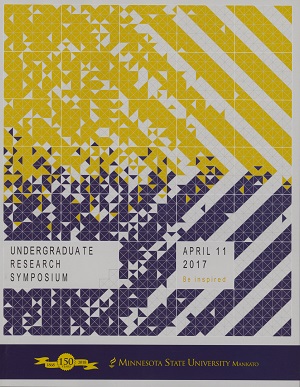The Influence of Personality on Deception Detection Ability
Location
CSU Ballroom
Start Date
11-4-2017 2:00 PM
End Date
11-4-2017 3:30 PM
Student's Major
Psychology
Student's College
Social and Behavioral Sciences
Mentor's Name
Emily Stark
Mentor's Department
Psychology
Mentor's College
Social and Behavioral Sciences
Description
Deception detection is a valued skill in the justice system, but a meta-analysis of studies completed by Bond and DePaulo found that people are only slightly better than chance at distinguishing truth from lies (2006). Although studies show that people are only accurate at detecting lies about 54% of the time, researchers are still examining individual differences in deception detection abilities because it is a cherished skill (Bond & DePaulo, 2006). In this study, students used a computer to view video clips of eight undergraduate students each telling a different story, four of which are true and four of which are a lie. Students then indicated whether they believed the person was telling a truth or a lie and filled out a short personality scale (adapted from Eysenck, 1971) measuring the Big Five personality traits. This study hypothesizes that individuals who score high on openness to experience, agreeableness, and extraversion will be better able to detect deception than individuals who score low on those traits. Data collection is currently underway and will hopefully reveal individual differences in deception detection abilities.
The Influence of Personality on Deception Detection Ability
CSU Ballroom
Deception detection is a valued skill in the justice system, but a meta-analysis of studies completed by Bond and DePaulo found that people are only slightly better than chance at distinguishing truth from lies (2006). Although studies show that people are only accurate at detecting lies about 54% of the time, researchers are still examining individual differences in deception detection abilities because it is a cherished skill (Bond & DePaulo, 2006). In this study, students used a computer to view video clips of eight undergraduate students each telling a different story, four of which are true and four of which are a lie. Students then indicated whether they believed the person was telling a truth or a lie and filled out a short personality scale (adapted from Eysenck, 1971) measuring the Big Five personality traits. This study hypothesizes that individuals who score high on openness to experience, agreeableness, and extraversion will be better able to detect deception than individuals who score low on those traits. Data collection is currently underway and will hopefully reveal individual differences in deception detection abilities.
Recommended Citation
McClain, Natosha. "The Influence of Personality on Deception Detection Ability." Undergraduate Research Symposium, Mankato, MN, April 11, 2017.
https://cornerstone.lib.mnsu.edu/urs/2017/poster-session-B/33




